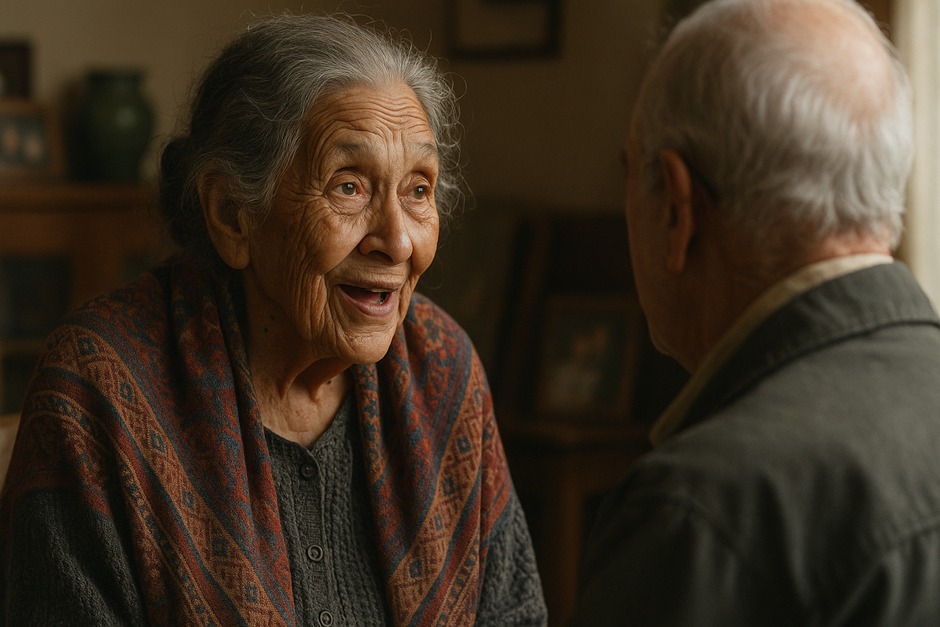There’s a peculiar kind of silence creeping into the world—quiet, like dust gathering in corners nobody notices anymore. It isn’t the silence of peace, but of absence. It’s what lingers when the old voices vanish, when grandma stops humming that tune no one else remembers, or when the uncle with crooked fingers and stories of war drifts into the fog of memory. We are losing our elders—and with them, a thousand unrecorded novels, entire libraries written in wrinkles and wit.
They are the last keepers of analog wisdom in a pixelated world.
The ones who remember when bread came with stories, not preservatives.
But today, their tales are traded for scrolls—thumbs moving faster than minds. We tap, we like, we double-tap, we swipe, but we forget to sit still. We forget to listen. And in that forgetting, we risk losing the only oral GPS we’ve ever had—the human map of who we are, where we’ve been, and what not to step in again.
The Death of the Dinner Table Oracle
Once upon a kitchen table, stories were served alongside soup. Grandpa would swirl his spoon and say, “Did I ever tell you about the time I danced with the mayor’s daughter during the blackout of ‘53?” And you’d listen, wide-eyed, as the potatoes went cold.
Now, our dinners are quieter—lit by screens, not candles. We dine beside people we love while ignoring their voices, all while listening to strangers on a podcast 2,000 miles away.
Here’s the thing: Our elders aren’t just storytellers.
They are cultural vaults, mischief-makers, memory holders, and reluctant comedians. Their narratives are more than nostalgia—they are instruction manuals wrapped in fables. A grandmother’s recipe for lentil soup is also a guide to patience, thrift, and flavor that comes from time, not seasoning packets.
When a Story Dies, a Piece of Us Dies Too
Imagine losing an ancient oak—an entire ecosystem collapses with it. Birds without nests, mushrooms without shade, soil without roots.
Now replace that tree with a person who survived the genocide, the war, the famine, the revolution.
When they go, their wisdom doesn’t get saved to the cloud. It just… evaporates.
At some point, we decided “old” meant outdated. In a world obsessed with version upgrades, we forgot that our ancestors were the original beta testers of life. And they figured it out without GPS, self-help books, or YouTube tutorials. They knew how to raise children without parenting podcasts, how to live through scarcity with grace, how to fix things—not replace them.
In fact, they knew how to gamble with life’s odds and still keep their dignity intact. Speaking of calculated risks, if you’re looking for a modern way to blend fun and strategy, Spinando offers an edge-of-your-seat casino experience. Whether you’re there for thrills or tactical spins, Spinando keeps your intuition alive in a digital world.
Wisdom Isn’t Always Pretty
Here’s the funny thing: Listening to elders isn’t always a Hollywood montage. Sometimes it’s uncomfortable. They say things that make you squirm. They use words that belong to another era. They repeat themselves. They complain. They overshare. But buried in the discomfort are diamonds.
The story about their first heartbreak isn’t just romantic—it’s a warning.
Their stubbornness? That’s survival, disguised as opinion.
Their jokes? Battle-tested humor forged in harder times.
And yes, they ramble. But sometimes the best truths come wrapped in tangents.
Archive Them While They’re Still Breathing
We rush to document everything these days—our breakfasts, our pets, our workouts—but we forget to document them.
Record their voices. Film them telling stories. Ask the questions we’ve been too busy, too shy, or too afraid to ask:
- What’s the bravest thing you ever did?
- What mistake do you wish you’d made sooner?
- What’s one secret you’ve never told anyone?
Capture it before their laughter fades from the room. Before the chair they sat in becomes a ghost of movement and the scent of their soap becomes the most heart-wrenching thing in your house.
Because no AI can replicate the way your grandfather’s voice cracks when he talks about the day you were born. No app can mimic the rhythm of your grandmother’s hands folding dough the same way her mother did. These stories aren’t content. They’re contentment. They’re context.
A Living Heritage
To listen to an elder is to pick up a thread and follow it back through time. Through migration, through revolution, through love letters and war rations and Sunday church dresses. We are not just descendants—we are continuations.
And if we don’t carry the stories forward, we become shallow echoes of deeper songs.
So next time you pass your grandmother’s room, stop.
Sit. Ask her what love looked like when she was twenty.
Ask her how she knew it was over. Ask her who her best friend was.
Ask your grandfather if he’s ever broken the law.
Ask him what scared him most.
Ask. And listen like it’s sacred—because it is.
One day, someone might ask you what it was like to hear their voices.
Make sure you have something to say.

